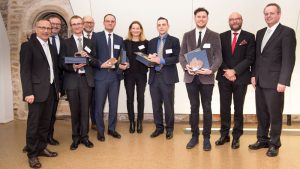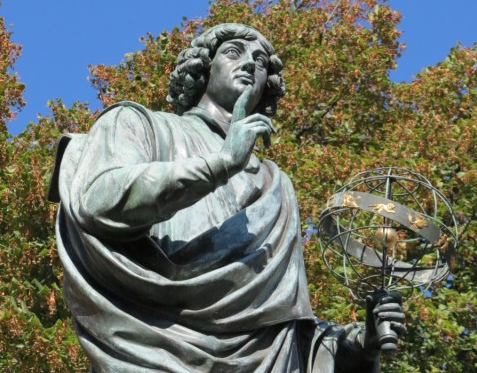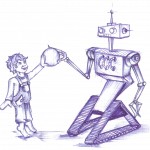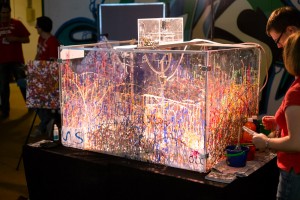
Dr. Andreas Bischof (3rd from right) awarded with the prize for an excellent dissertation on communication. One of the first congratulators was Dr. Eberhard Alles (right), Chancellor of the TU Chemnitz. Copyright: Dresdner Gesprächskreis
During his time as a CrossWorlds PhD-student Andreas Bischof conducted ethnographic research in social robotics labs around the world. The sociologist was eagerly interested to find out, how engineers and computer scientists make robots for everyday worlds ‘social’. His participant observations in human-robot interaction resulted in a study reconstructing the social conditions of social robotics and the practices within this field of research and development.
Bischof’s thesis, which he defended last year, and the following book »Soziale Maschinen bauen« are recently receiving great interest. After being awarded with the dissertation prize of the “Commerzbank AG Niederlassung Chemnitz”, the “Dresdner Gesprächskreis der Wirtschaft und Wissenschaft” awarded one of his annual prizes for outstanding young scientists last thursday.
One week earlier, the national daily newspaper F.A.Z. recognized his study as “realistic and reflected look behind the scenes” of human-robot interaction. The science journalist Dr. Manuela Lenzen wrote: “Bischof rightly raises the question of whether the design of the robots, which are supposed to live with us, can be left to such pragmatism. If tasks are broken down into technically manageable parts, the social aspects of social robotics could become shortened to an optimazation problem.” (F.A.Z., 11/11/2017, PayWall)
Andreas Bischof wrote his dissertation at the Chair of Media Communication, where he was supervised by Prof. Dr. Claudia Fraas. Today, Bischof is a member of the junior research group “Miteinander” at the Faculty of Computer Science.


